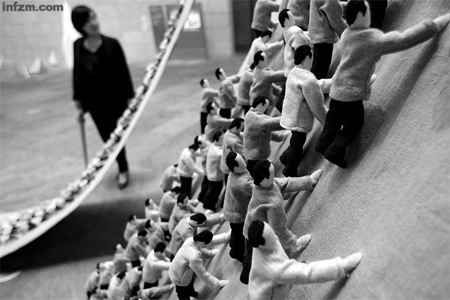
In China, many supposedly "middle-income" urban families feel let down by the social ranking. (Photo: ImagineChina)
(Ecns.cn) – Around the world the middle class is usually defined according to household income, occupation or educational background. However, its definition is currently less clear in China, where many supposedly "middle-income" urban families feel let down by the social ranking.
On December 21, the National Bureau of Statistics (NBS) released a report on the country's progress in building a well-off society, in which it said the fulfillment was 80.1 percent with per capita GDP of 29,992 yuan ($4,760) and per capita disposable income of 10,046 yuan ($1,594) in 2010, up about 2 percentage points annually since 2000.
With the past three decades of economic development, more and more Chinese citizens are now stepping into the burgeoning middle class. It was reported that within a generation, China's entire population is expected to be middle class by World Bank standards in 2030.
But when some people realize that they have been categorized as middle class in China, they are far from encouraged.
Well-off but not happy
Ma Tianchi, 26, is an employee at the Changjiang Pension Insurance Company. His pre-tax monthly income is nearly 10,000 yuan ($1,587) with disposable income of about 6,500 yuan ($1,032) every month, which is 7.8 times the national average, reported the Southern Weekend.
On December 22, Ma went to work as usual and read about the NBS report. Although he was defined as middle class in China, Ma was not reassured. Instead, he was surprised that he had become one of "them" even though he was not yet satisfied by his living standards.
Wang Shan (alias), 39, is a senior editor working for a finance and economics magazine in Beijing. Together with her husband, who is a senior salesperson, the family's annual income is about 400,000 yuan ($63,480), but they too have doubts about their status as middle class.
Since September 1, China has raised the threshold at which individuals must pay income tax from 2,000 yuan to 3,500 yuan. That means the amount of salary that Wang Shan receives every month has decreased, because she has to pay more tax according to the new regulation.
As a result, the family's annual income has shrunk and they have not been able to spend as much as before. Wang said she is obviously not affluent, and not even middle class. She said she is not leading a happy life at the moment, as her disposable resources have been lessened this year.
Who is middle class?
A global standard for middle class is usually based on occupation, income and educational background. However, such criteria cannot be simply applied to Chinese citizens, as the situation varies greatly from region to region.
In Northwest China's Gansu Province, a monthly income of 3,500 yuan is a higher level for wage earners. However, with such a sum of money, one could not afford even daily expenses in cities such as Beijing, Shanghai and Guangzhou.
Apparently it is not a scientific approach to define the middle class by income, but occupation is a better choice, said Lu Xueyi, professor of sociology at the Chinese Academy of Social Sciences.
When using income as the criteria, Ma Tianchi and Wang Shan are both middle class, but they have shown a strong sense of identity, which is a common phenomenon for members of the Chinese bourgeoisie.
But judging by occupation makes the case different. Though their incomes may vary, a lecturer in a first-tier city and one in a third-tier city have a similar social status and live by similar standards, said Lu.
Meanwhile, for the middle class, the goal of life should be to realize his or her own value, not just apartments, cars and savings. But this requires the government to narrow the gap between rich and poor and balance the distribution of social wealth. Only under such condition can citizens feel secure and gradually shake off their mental struggle to keep up with richer people, said Lu.
The current problem that most Chinese bourgeoisie are facing is that they think of themselves as the "sandwich" class. They must pay mortgage loans every month, and they always feel that their disposable money won't last long. They can detect their middle class genes by looking at their purchase power, but they do not think their incomes are competitive and able to satisfy most of their needs.
The standard of incomes has already led society to focus too much on money, Lu added.
Lu cited a survey he had taken in Japan in 1985. At that time, the average annual income of Japanese citizens was $5,000, and 80% of them thought they were middle class. However, in big cities such as Beijing, Shanghai and Guangzhou, most wage earners at a similar income level do not think the same.
In this regard, the genuine middle class refers to a group of common people with a range of occupations that give them a pleasant state of mind and inner peace, and their knowledge and economic status make their value and their attitude towards life more recognized by society.

Copyright ©1999-2011 Chinanews.com. All rights reserved.
Reproduction in whole or in part without permission is prohibited.